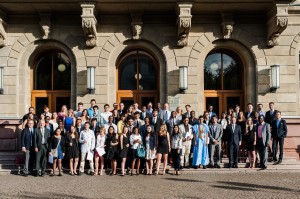Grilling By Judges? It’s Not Just for Moot Court.
 Perhaps it is because I just spent an enjoyable few weeks judging the Appellate Writing and Advocacy class moot court rounds, that lately I have taken a few detours while doing research. While reading some of the NSA phone data cases, I watched an enlightening and very entertaining appellate argument online. We may wait a long time to see video recordings of U.S. Supreme Court arguments, but the Circuit Courts of Appeal oblige us for some of their cases, which is a bonus for everyone including students.
Perhaps it is because I just spent an enjoyable few weeks judging the Appellate Writing and Advocacy class moot court rounds, that lately I have taken a few detours while doing research. While reading some of the NSA phone data cases, I watched an enlightening and very entertaining appellate argument online. We may wait a long time to see video recordings of U.S. Supreme Court arguments, but the Circuit Courts of Appeal oblige us for some of their cases, which is a bonus for everyone including students.
Several plaintiffs’ lawsuits that challenge the National Security Administration’s phone records surveillance program are making their way through the federal courts. Plaintiffs in these cases have claimed the NSA data grab violated their rights under the Fourth Amendment or that Section 215 of the Patriot Act, the original basis for the surveillance under President George W. Bush, cannot reasonably be interpreted as allowing the program. For students who participate in a moot court competition, or are considering it in the future, video of the oral arguments in these cases provides an opportunity to learn something about the privacy issues and also to see the types of questions and atmosphere an attorney might expect from a federal appellate panel.

